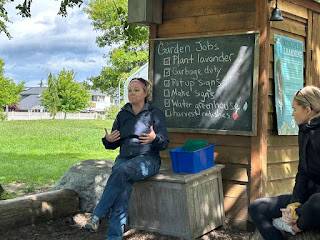On a late Tuesday morning, we headed out to visit Homma Elementary School and observe the innovative outdoor classroom garden. We met up in a wooden gazebo and had a productive discussion about gardening and the curriculum with Megan Zeni. Megan then bridged the outdoor experiences with the BC curriculum, highlighting how the garden aligns with curricular competencies and big ideas. She illustrated how subjects like science were addressed in the garden such as when children are in the rain and see the water cycle happen. An interesting note was that after the pandemic, it is now a more crucial time for outdoor learning to take place.
Megan then took us on a guided tour of the garden. The tour began with an exploration of the various plants thriving in the garden. Megan explained how each plant was chosen not only for its educational value but also for its ability to engage the students and provide tasty treats. One of the highlights for me was the Bug Hotel, where students would relocate insects to this hotel as a means of learning compassion. From fragrant herbs to colorful flowers and hearty vegetables, the garden depicted diversity of plant life.
One of the most intriguing aspects of Megan's talk during the tour was her emphasis on the importance of risky play. She explained that allowing children to take calculated risks, like balancing on logs and playing with tires, helps them develop critical life skills such as problem-solving, resilience, and confidence. But in order for students to engage in risky place, an elaborate scaffolding took place where students learned to move with their bodies and understand the importance of space and consent.
The outdoor classroom at Homma Elementary was not just a place for learning about plants; it's a holistic educational environment that nurtured confidence in growth for the students. Megan emphasized how the garden helps students develop a love for learning, a connection to nature, and a sense of responsibility.








No comments:
Post a Comment